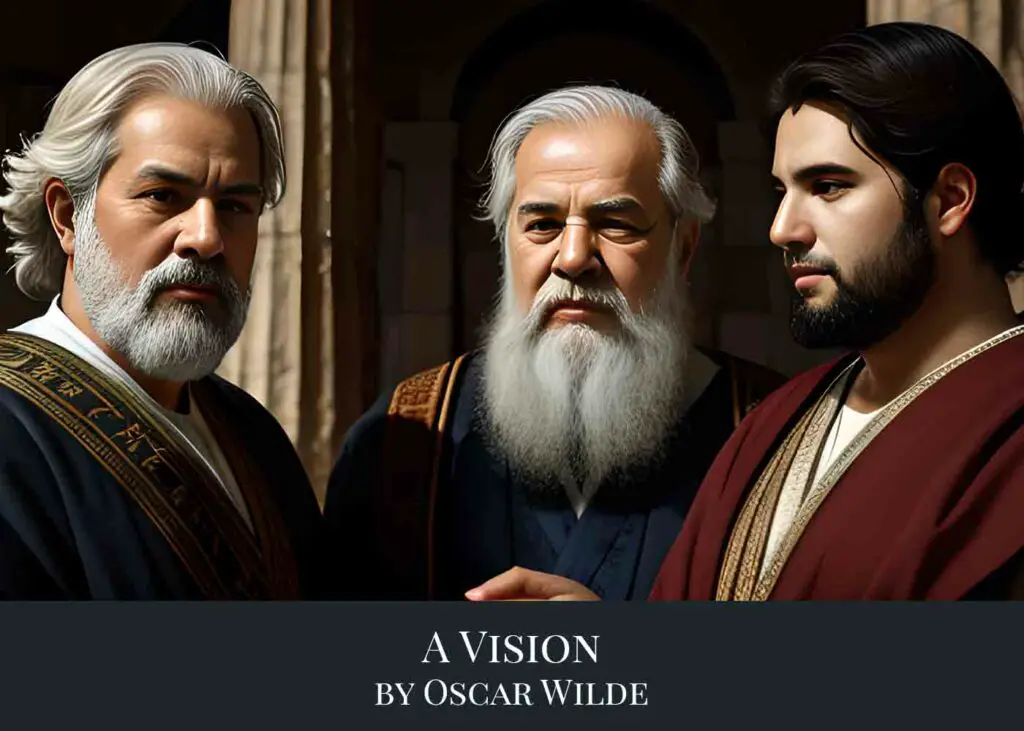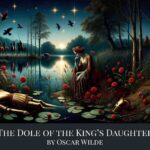
A Vision by Oscar Wilde
“A Vision” by playwright, poet and writer Oscar Wilde is a captivating exploration of three iconic figures, Aeschylus, Sophocles, and Euripides, each laden with symbolism and emotion. “A Vision” is found within the pages of Poems, Wilde’s first poetry volume. You can immerse yourself in Wilde’s poetic masterpieces by visiting the online book of Poems on PageVio.
1. The Poem
Two crownèd Kings, and One that stood alone
With no green weight of laurels round his head,
But with sad eyes as one uncomforted,
And wearied with man’s never-ceasing moan
For sins no bleating victim can atone,
And sweet long lips with tears and kisses fed.
Girt was he in a garment black and red,
And at his feet I marked a broken stone
Which sent up lilies, dove-like, to his knees.
Now at their sight, my heart being lit with flame,
I cried to Beatricé, ‘Who are these?’
And she made answer, knowing well each name,
‘Æschylos first, the second Sophokles,
And last (wide stream of tears!) Euripides.’

Size: 8″ x 12″ (2:3 ratio)
Format: PDF
Copyright information: For personal use only
Note: Actual poster background color is white. For the sample poster, the background is made gray for illustration purpose.
2. A Vision Analysis
This poem refers to three great tragedians of ancient Greek literature: Aeschylus, Sophocles, and Euripides. Each of these poets wrote plays that are central to the tradition of Greek tragedy. The poem uses vivid imagery to convey both the stature and the emotional depth of these figures.
Two crownèd Kings, and One that stood alone
This line sets the stage for the introduction of the three tragedians. The “two crownèd Kings” likely refer to Aeschylus and Sophocles, who were revered in their time and often won the dramatic competitions in Athens. The one “that stood alone” is Euripides, who was known for his innovative and sometimes controversial approach to drama.
With no green weight of laurels round his head
Laurel wreaths were symbols of honor in ancient Greece. The absence of laurels around the head of the third figure (Euripides) suggests that he was not always as celebrated during his lifetime as the other two tragedians.
And wearied with man’s never-ceasing moan / For sins no bleating victim can atone
These lines capture the essence of Greek tragedy, which often focused on human suffering, moral dilemmas, and the limitations of human beings in the face of destiny or the gods. The reference to “sins no bleating victim can atone” alludes to the Greek practice of animal sacrifice, hinting that such rituals cannot resolve the deeper moral and existential quandaries explored in tragedy.
Girt was he in a garment black and red
This could symbolize the themes of death, suffering, and intense emotion that are prevalent in the works of these tragedians.
And at his feet I marked a broken stone / Which sent up lilies, dove-like, to his knees
The broken stone could represent the ruins of ancient Greece or the tragedies themselves, which, though born from the brokenness of human experience, produce something beautiful and transcendent, like lilies.
Now at their sight, my heart being lit with flame, / I cried to Beatricé, ‘Who are these?’
The speaker is deeply moved upon seeing these figures and seeks knowledge about them. Beatrice, a character from Dante’s “Divine Comedy,” often symbolizes divine wisdom and enlightenment.
Æschylos first, the second Sophokles, / And last (wide stream of tears!) Euripides
Beatrice identifies the tragedians in order of their historical appearance: Aeschylus, known as the father of tragedy; Sophocles, celebrated for his refined style and deep insight into human nature; and Euripides, renowned for his realistic characters and exploration of psychological complexity.
The poem is a tribute to the lasting impact of these playwrights, whose works continue to resonate for their exploration of human nature and the human condition. The imagery and emotional tone convey reverence and a profound sense of the beauty and tragedy inherent in the human experience, as reflected in the works of these ancient Greek playwrights.
3. Conclusion
If you find enjoyment in “A Vision,” you might want to explore a list of poems authored by Oscar Wilde.




